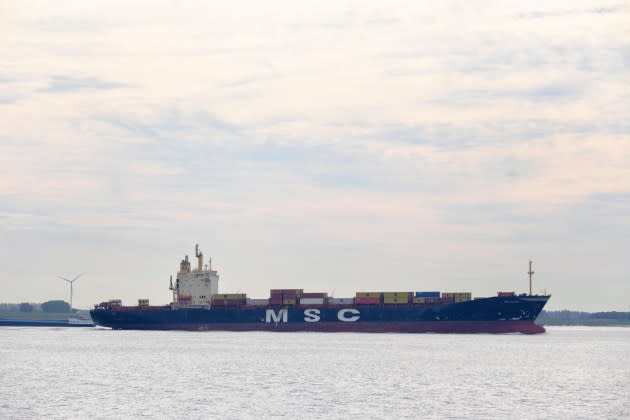Experts Relay Red Sea Risk to Congress as Levi’s Endures Two-Week Delays

At a Congressional hearing addressing the Red Sea crisis, three trade experts relayed a common theme: expect costs to go up as ships keep spurning the conflict-ridden waterway.
Jonathan Gold, vice president of supply chain and customs policy, National Retail Federation (NRF), said the higher expenses are already being passed to SMBs that “don’t have the ability to negotiate [long-term shipping contracts] and push those costs off.”
More from Sourcing Journal
How Levi's Is Preparing for Another Season of Record-Breaking Heat
UN Trade Body Has 'Profound Concerns' Over Panama Canal, Red Sea Disruptions
Loose Threads: News from EB Denim, Still Here, Levi's and More
Consumer prices are expected to be impacted at a “far greater” pace than oil prices, according to Dr. Ian Ralby, founder and CEO of maritime law consultancy I.R. Consilium. Ralby cited that roughly 30 percent of global container traffic traverses the Red Sea, compared to 10 percent of oil supply.
“Once oil is refined, it can be replicated and supplanted by different shipments from all over the world,” said Ralby. “Goods are targeted toward specific purchasers. There are a different set of equities for the container carriers versus the wider energy industry.”
In his opening testimony, Gold said NRF members want to ensure the new fees and surcharges associated with the disruptions cover real costs, “and are not intended for profit.”
“One member has told me that they’ve had carriers ask for an increase of $1,500 to $3,000 per container, which represents a 38 percent-to-73 percent cost increase for directly affected cargo,” said Gold at the hearing. “We’re also hearing that the rates and surcharges are not just being applied to directly impacted cargo, but to other routes such as the E.U.-to-U.S. route because of equipment availability.”
Although inflation has been a concern as container ships continue to divert around Africa, Gold said “it’s too early to tell what that impact is going to be.”
The two-hour hearing also gave insight into how the world’s largest container shipping company, and potentially others, may handle the crisis if Houthi attacks on commercial vessels persist.
If the ongoing missile attacks in the waterway linger for an extended period, Mediterranean Shipping Company (MSC) “will adapt,” according to Bud Darr, executive vice president of maritime policy and government affairs at the ocean carrier.
During the hearing, Darr raised the possibility of shifting more container volumes to different hubs for the purpose of transshipping, which is the unloading of goods from one ship at an intermediate destination, before being loaded to another vessel.
“Maybe we are going to avoid the Suez Canal altogether,” posited Darr.
Darr’s suggestion came with a caveat, aligning with the thoughts of Gold and Ralby. “I can assure you, we’ll meet the need, but it will be more expensive. There will be costs associated with that,” he said.
Levi’s sees 10-to-14-day delays
The hearing occurred as more global brands are feeling the effects of the delays. Levi Strauss & Co. is seeing a 10-to-14-day increase in transit times, said chief financial and growth officer Harmit Singh.
Singh said his operations and commercial teams were “working around the clock,” but that the company’s contingency plans were “not going to break the bank.”
“We’ve already shifted some product to go through the West Coast instead of the East Coast, and that’s easing some of this impact,” said Singh, fulfilling some analyst predictions that the U.S. East Coast would be impacted the second-most by the mass rerouting of ships away from the Red Sea, after Europe.
While roughly 70 percent of Levi’s ocean freight is currently under a three-year contract, pricing concerns do exist for the remaining cargo that is on a one-year deal. If the current crisis continues through the second half of the year, Singh said there is some risk to costs.
During the Congressional hearing, Gold touched on similar concerns: “As we’re in a new negotiating cycle for contracts, that’s going to be an impact [on costs].”
In another such example of how brands are being impacted by the Red Sea, a Wednesday Reuters report said a Maersk container ship hosting cargo for Walmart, H&M, Adidas and Asos had a five-day delay on its journey from Thailand to Norfolk, Va. The voyage of the Maersk Tanjong lasted from Dec. 2 to Jan. 19.
But relatively quick delays aren’t always the case. Some of Maersk’s ships including Maersk’s Londrina and San Clemente, started their voyages in November and are now not due to dock at their final destinations until mid-February, after delays of more than 50 days, tracking platform ShipsGo.
RILA says: ‘No easy answers’
The delays resulting from the Red Sea skirmish are concerning to another retail organization, the Retail Industry Leaders Association (RILA), which called on policymakers and the Biden administration to continue working with experts to understand the supply chain impacts of the red Sea conflict.
“Although retail supply chains are incredibly flexible by design, escalated and prolonged disruptions will lead to more severe challenges for U.S. businesses, to including inventory delays and higher costs,” said Sarah Gilmore, director for supply chain policy, RILA, in a statement. “There are no easy answers or overnight solutions to the larger geopolitical factors at play in this situation.”
